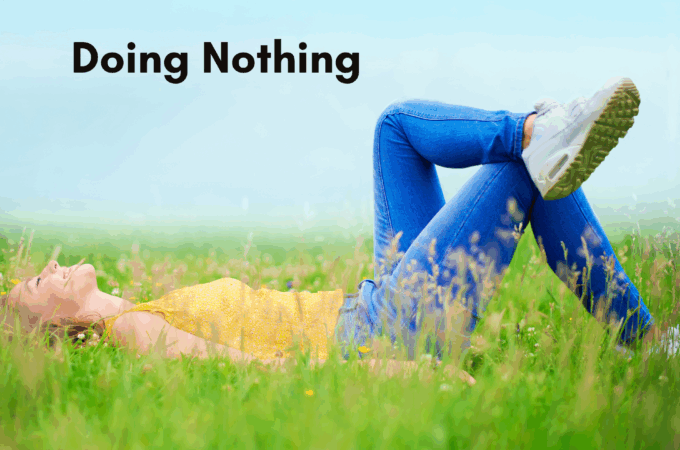The Italians have a saying: dolce far niente. It means the “sweetness of doing nothing.” Basically, it encourages people to spend time not doing much, just enjoying themselves.
This concept may seem completely foreign to those of us who live in the United States. Consumer culture and productivity culture are so prevalent that we have internalized them, and it’s easy to wrap our self-worth around our work or productivity and/or our buying and owning material goods.
But God did not create us to continuously work, produce, and consume. God gave us the gift of Sabbath rest, time set aside to renew our spirits, be with loved ones, and yes– do nothing.
Doing nothing benefits our well-being; when we are resting and not striving for anything in particular, our body is able to rest and heal. Our brains get a break, and our souls find rest in God.
When Doing Nothing Causes Anxiety
If the idea of doing nothing brings some anxiety for you, you are not alone. We are so used to pushing ourselves past what is good for us– so the idea of doing nothing and being idle for a while can feel incredibly scary. Dr. Francine Toder, in her article “Doing Absolutely Nothing Has Mental Health Benefits,” gives some advice on how to work through this anxiety:
- Remind yourself that you can stop what you’re doing (or not doing, as it were) and resume normal activity anytime you want—but wait a few minutes before you do to see if the discomfort passes.
- Stay with your plan and intention to do nothing but breathe slowly to calm down any jitters. Start with a slow and long out-breath and then an in-breath as deeply as is comfortable. Continue this way of breathing for at least one minute. Mindful breathing is an effective strategy that can be applied to all anxiety symptoms.
- If your comfort level hasn’t improved, ground yourself in the here and now. Look around you at four objects that are familiar and pleasant. Listen for three familiar sounds—maybe the hum of a fan or refrigerator, birds chirping, dishwasher running, and so forth. Find two objects that are soothing to the touch and stroke them—like a blanket, a sweater, a pet, or a warm wet washcloth. Nurturing any of your senses lends a sense of calmness.
When we work through our anxiety of doing nothing, we are breaking the unhealthy cycles of consumerism and productivity culture, within ourselves and for those who notice us living differently.
Doing Nothing is Not an Excuse for Not Helping People
When we are talking about “doing nothing,” we are talking about God’s gift of rest and revitalization. We are not called to use this rest as an excuse to not take action when people need help.
Last time, we looked at the Bible story of the man with a withered hand from the perspective of Mark and righteous anger. This time, we will look at the same story from the perspective of Matthew and Sabbath rest.
[Jesus] left that place and entered their synagogue; a man was there with a withered hand, and they asked him, “Is it lawful to cure on the Sabbath?” so that they might accuse him. He said to them, “Suppose one of you has only one sheep and it falls into a pit on the Sabbath; will you not lay hold of it and lift it out? How much more valuable is a human being than a sheep! So it is lawful to do good on the Sabbath.” Then he said to the man, “Stretch out your hand.” He stretched it out, and it was restored, as sound as the other. But the Pharisees went out and conspired against him, how to destroy him.
Matthew 12:9-14
The Pharisees (the religious leaders) are so focused on the rules that are established around Sabbath rest, that they are unable to see that a man needs help. Jesus rebukes them, and says that if they would save a sheep in a pit on the Sabbath, they should definitely help a human being out on the Sabbath.
The Pharisees saw Sabbath as one more law to fulfill; Jesus saw the Sabbath as a gift from God, an opportunity to rest and also help those who need help.
Doing Nothing and Self-Care
When we “do nothing” and take part in God’s gift of Sabbath rest, we are saying yes to God’s invitation to take care of ourselves and prioritize our well-being. Self-care can often take a backseat to everything else in our lives, but God calls us to focus on those things that are most important (as Christian minimalism reminds us!) and to care for ourselves by setting aside time for rest and renewal.
We can prioritize this rest by taking some time– even small amounts of time, like a half hour during a busy day– to “do nothing” and be with God and/or loved ones.
So then, a Sabbath rest still remains for the people of God, for those who enter God’s rest also rest from their labors as God did from his [during Creation]. Let us therefore make every effort to enter that rest…
Hebrews 4:9-11a
How is God inviting YOU to set some time aside for rest?
Did you like this post? Check out the Christian Minimalism book!


0 Comments